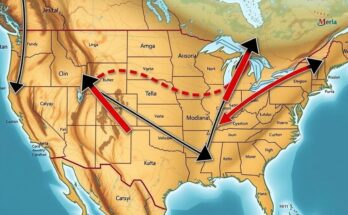Mauritania has distanced itself from Sudan RSF adviser Mohamed Al-Mukhtar’s visit, stating it was not government-sanctioned. Public outcry over his presence stems from his alleged involvement in atrocities linked to Sudan’s conflict. The government’s response aims to manage reputational risks and maintain neutrality regarding the Sudanese crisis.
On May 1, the Mauritanian Government officially distanced itself from the visit of Mohamed Al-Mukhtar, a senior adviser to the commander of Sudan’s Rapid Support Forces (RSF). This decision comes amid significant public backlash regarding Al-Mukhtar’s presence in the country, which the government claims was purely for personal reasons.
During a press briefing held in the capital, Nouakchott, El-Houssein Ould Meddou, Mauritania’s Minister of Culture and government spokesperson, emphasized that Al-Mukhtar was not invited by the state. “The government did not invite the political adviser to the commander of Sudan’s RSF,” he stated clearly, adding that the encounter was based on a “personal invitation” and carried no official diplomatic implications.
Al-Mukhtar reportedly attended religious gatherings under the general caliphate of the Qadiriyya Sufi order in West Africa. However, his participation in a significant religious event in Nimjatt, a village in the western Trarza region, has sparked serious criticism within Mauritanian society.
The uproar is largely attributed to Al-Mukhtar’s alleged connection to serious human rights violations linked to the conflict in Sudan. As a prominent figure within the RSF—an armed group notorious for committing brutal acts, including genocide—his unchallenged presence in Mauritania has raised ethical and political concerns.
Civil society organizations and political commentators have called on the government to expel Al-Mukhtar, amplifying their demands for accountability and a firm stance on Sudan’s dire humanitarian situation via various media outlets.
The government’s effort to clarify its disconnection from Al-Mukhtar appears to be an attempt to mitigate potential reputational damage and reaffirm its neutrality concerning the ongoing conflict in Sudan. Yet, the situation raises critical questions surrounding the complex interplay of religion, diplomacy, and justice in the region’s already fragile security landscape.
As Mauritania navigates this controversial incident, it must balance public sentiment with its foreign relations, illustrating the challenges faced by governments in managing global human rights discourse while maintaining domestic stability.
In conclusion, Mauritania’s distancing from Al-Mukhtar’s visit highlights the sensitive dynamics between diplomacy, religion, and justice within the region. The government’s response to public backlash reflects its need to preserve its image and avoid complicity in Sudan’s alleged human rights violations. This situation underscores the challenges governments face in balancing external relations and domestic expectations, particularly in light of humanitarian crises.
Original Source: northafricapost.com




